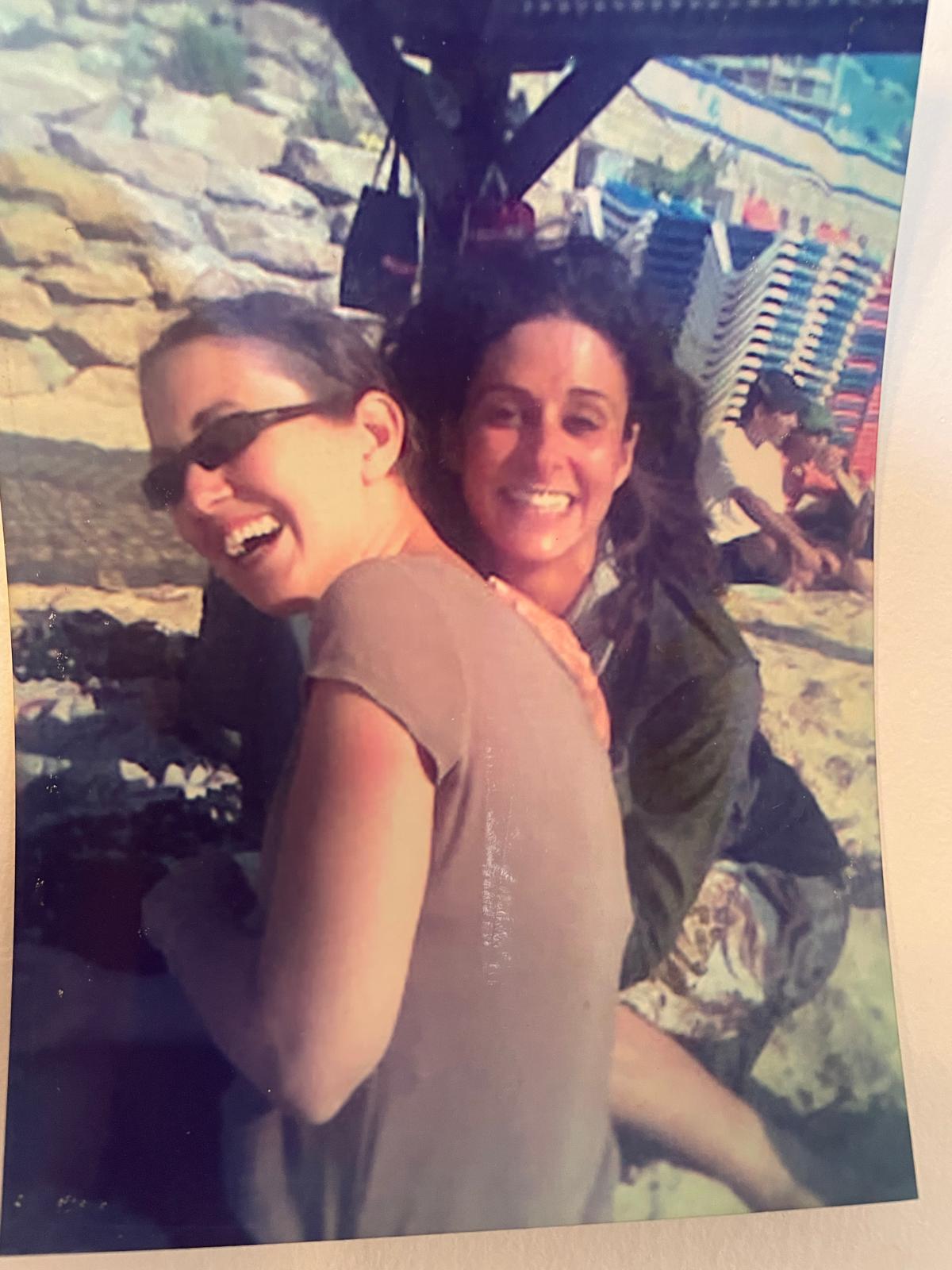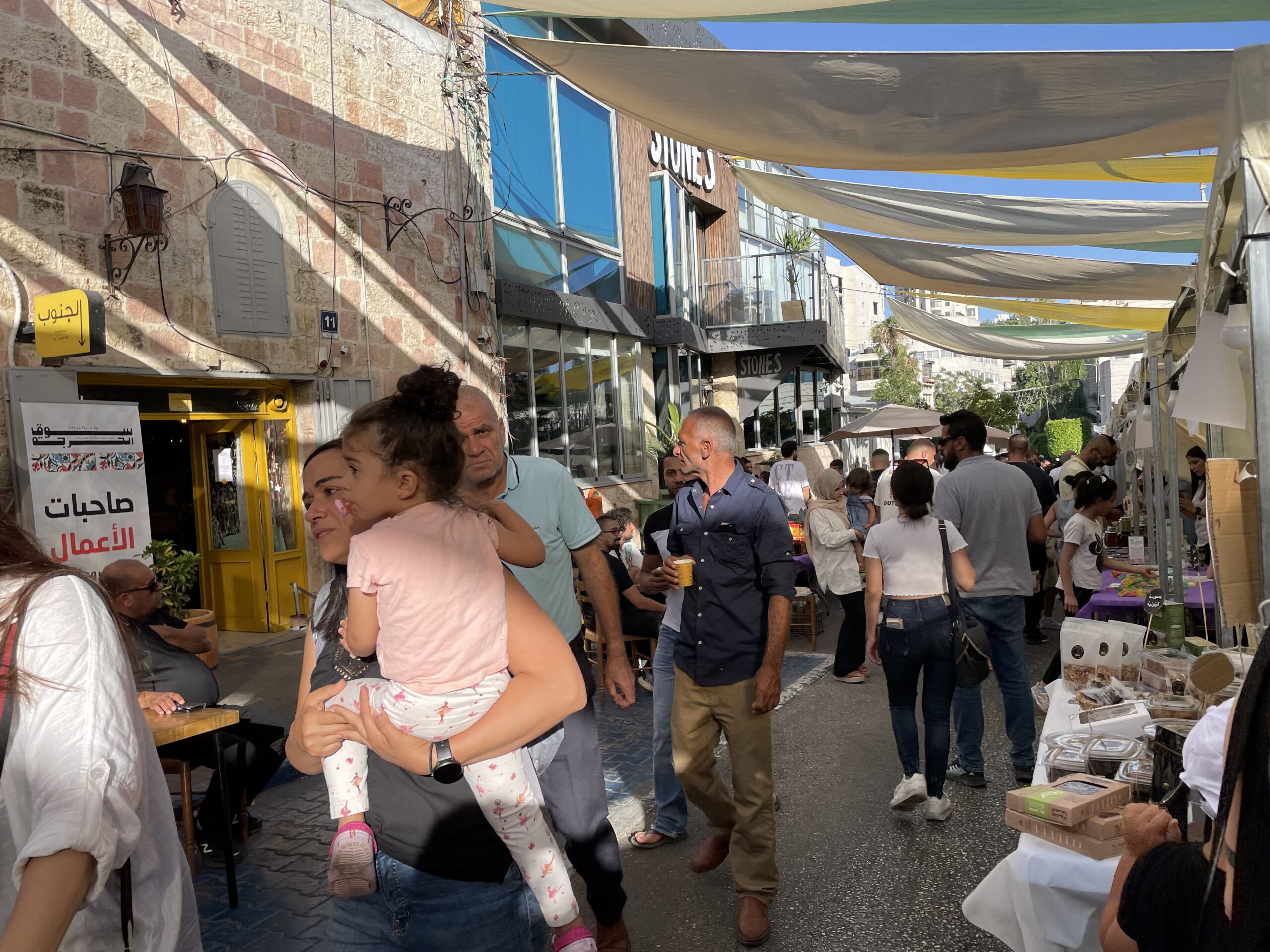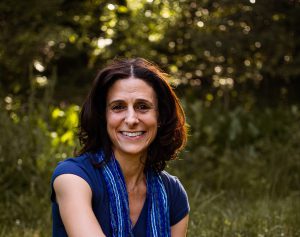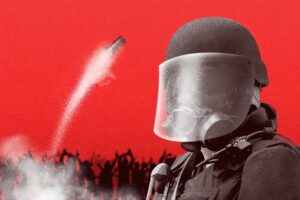When my daughter said that I speak Hebrew, a girl in summer camp pantomimed firing a gun and asked, “Is your mother one of them?”
“Ima! There are kids up there, and they’re speaking Arabic!”
After a year and a half in North Carolina, we returned to Ramallah. Against all odds, we even managed to get permission from the Israeli military for my partner, Osama, to fly with the children and me into the airport in Israel. We picked up my car from friends in Tel Aviv, packed it with suitcases and began the drive to Ramallah.
It was Friday night, the Jewish Sabbath, and the Israeli settlements along the way were quiet. When we turned toward the Palestinian villages outside Ramallah, the noise overwhelmed us. It was the evening before Eid al-Adha, the Muslim Holiday of Sacrifice. The streets were full of people – young men and families with children walked in the middle of the streets, greeting each other and buying coffee, candy and sweet lupine from roadside stands. The girls wore party dresses, and the boys were dressed in button-down shirts, their short hair plastered down neatly. Drivers honked loudly and cut in front of me.
“I didn’t miss this place,” Osama said dryly. But the children were thrilled by the late-night, lively urban activity. Eight-year old Forat explained to her younger brother: “Adam, this is Ramallah. We live here.” Her sense of belonging took me by surprise. After all our travels throughout the world, she feels this is her home.
The next day, we sent Forat and Adam to play in the garden so that we could wash the layer of dust that had settled on the floors and furniture. Karam and Sama, the children who live in the apartment above us, called out from their balcony. Forat greeted them in English, but Adam, who had been three years old when we left, didn’t remember them. He raced into the house and delivered the exciting news: “Ima! There are kids up there, and they’re speaking Arabic!”
We began setting up the apartment. Forat and Adam had forgotten about their toys. Each time we unpacked a carton of loot, they screamed in joy. Forat had already resumed speaking a few words in Arabic, a language that had been merely passive for the last year and a half.
Forat is growing up
Forat appeared to be an expert in matters of military occupation, at least insofar as they related to her daily life. One day, she returned with Osama from a visit to a friend and announced that they had twice taken detours because the Israeli army had blocked the roads.
“There was jaysh!” she said, using the Arabic word for army. Osama seemed less excited. He said the soldiers had blocked the western entrance to the city to allow Jewish settlers to pray at a site there. Ever since Forat was a little girl, I told her that the soldiers set up checkpoints and don’t allow her Palestinian father to cross, because they’re having trouble sharing. I wondered how much longer that explanation would satisfy her.

As I prepared to take the children to Jerusalem on errands, Forat explained to Adam: “Baba can’t come with us, because he doesn’t have a permit.” At the shopping mall in Jerusalem, Forat informed Adam that “Here, people speak Hebrew.” But then we entered an elevator and found ourselves next to a man, apparently a Palestinian citizen or resident of Israel, speaking Arabic on his cell phone. Forat’s eyes widened, and she gestured for me to bend down close to her face.
“Ima,” she whispered into my ear, “Is he allowed to be here?” Palestinian citizens and residents of Israel are allowed into Jerusalem, but Palestinians whom the Israeli government considers to be residents of Gaza or the West Bank are not.
I had worried about Forat’s return to the West Bank. She has reached the age at which children become more aware of their social and political surroundings and would have to deal with the complexity of being part of a mixed Israeli-Palestinian family. But she seems to be developing coping skills. After her first week of summer camp, Forat told Osama that one of the girls in the camp saw her eating a bag of apple chips and asked about the Hebrew writing on the package. In the course of the conversation, Forat told her friends that her mother speaks Hebrew. One of the girls made a gesture of firing a weapon and asked Forat if her mother is “one of those,” meaning an Israeli soldier.
“No!” Forat replied. “My mother fights them!” That was Forat’s explanation of my work promoting human rights and opposing the Israeli authorities’ oppression of Palestinians. I felt proud of Forat’s ability to distinguish between identity and actions and her confidence in explaining that distinction to her friends.

My friend Tally
The grief over the death of my friend Tally, who succumbed to cancer in May, followed me back to Palestine. I unpacked cartons containing household items that Tally gave me five years ago, when she and her family left their Tel Aviv apartment to move to the United States: a food processor, silicon baking trays and toys in a plastic bag labeled, in Tally’s handwriting, with the name of her older daughter.
One day Tally’s mother sent me a text message offering to proofread the posts for this blog, as Tally used to do. I wept in gratitude and pain and accepted her offer. Those who love Tally are gathering together, trying to fill a void that only widens as the weeks pass.
After a week back in our apartment, I dreamt of Tally. She was sitting next to me, and we were reading from my email account on a computer. Tally saw an email in which I sent a post about her death. She looked at me quizzically, and her face was serene and beautiful. I was afraid of offending her.
“That was when you died,” I said, embarrassed.
In the dream, she wasn’t offended. She smiled gently, and I put my arm around her shoulder and pulled her close to me. Her body was supple, not tortured. We sat like that in a silent half-embrace. I felt as if I were able to share with her my grief over her death, and to share in her pain over the fact that she had died.
I awoke with the sweet, sad taste of the proximity to her and the knowledge that in this new-old chapter of my life on which I was embarking – Tally would continue to be with me.

This post was also published in Hebrew on haaretz.co.il on August 2, 2022:
https://www.haaretz.co.il/family/umforat/2022-08-02/ty-article/.premium/00000182-592f-d339-a5ef-df2fbb4




very powerful, thank you for sharing
Thank you, Omar.
שלום אום פורת! קראתי את סיפרך , אני גאה בך ועל האומץ שלך להתמודד במציאות העכורה שלנו ולהישאר אנושית וללא שינאה יוקדת. חבל שאנו כה מעטים בחברה הישראלית. מקווה עבור נכדותי שיבוא יום בו יונפו דגלי ישראל ופלסטין על בנייני האומה. נכפר על הנכבה ונגיע לחירות ושוויון עם אחינו הפלסטינים.
תודה רבה, רבה, דניאל, על המילים החמות ועל הקריאה. אם מעניין אותך, יהיה ערב חגיגה לספר מקלובה בתיאטרון הערבי-עברי ביפו, בהשתתפות שחקנים כגון עינת ויצמן ודורי אנגל:
https://www.jaffatheatre.org.il/shows/maqluba/
שרי ואוסמה יקרים,
ברוכים תהיו בשובכם הביתה!
איחולם מכל הלב! שיהיה לכם רק טוב!
יהודה שרל
שבדיה
(ממתין בסבלנות ל״מקלובה״ באנגלית)
תודה, יהודה!
So sorry we never met when you were in North Carolina. My hope is for you and your family and all of your neighbors to live peaceful lives in a society where justice prevails.
Thank you, Richard.
מרגש עד דמעות
תודה, שרה. בזכותך 🙂
Beautiful writing, very moving x
פוסט מאוד מרגש. חסרים קולות כאלה בארץ המשוגעת שלנו.
תודה, יוכי.
So beautiful. You are a wonderful mother, partner and friend. So glad that you are on the side of righteousness.
Thank you!
Hamdilla is’sallaama to the four of you!
Thank you!
שרי יקרה,
תודה על המלים המצמררות וחדוֹּת המחשבה
על השמחה והכאב
בתנועה המתמדת בין מה שהיה ועודו נמצא לבין מה שלא יחזור.
שִיבה מבורכת לרמאללה וימים טובים.
תודה, קיקי! מתגעגעת 🙂
שרי היקרה,
ברוכים השבים לרמאללה (הביתה). מאחלת לכם קליטה מהירה, במיוחד לילדים.
הייתי מאוד רוצה להתייעץ איתך באשר לאשרות כניסה לארץ. איך אפשר ליצור איתך קשר?
I love your posts and await them eagerly.
Thank you, Susan!
Welcome back. Beautiful to read this. May Tally always feel close to you.
Thank you, great photos of Ramallah!
Thanks!
As long as you deny that the Zionist movement
1. planned replacement genocide from its start in 1881,
2. started its long planned genocide in Dec 1947 after the international community made anti-genocide jus cogens by banning genocide in Dec 1946, and
3. has never ceased to commit genocide,,
you are a foot soldier in the service of the criminal genocidal Zionist state and in the service of criminal genocidal Zionist movement.
When I lecture on genocide, I explain the following.
Americans often confuse genocide with mass murder and believe incorrectly that Holocaust-like systematic killing is required for genocide. If kings still ruled in Europe and if the King of France decreed that all Jews in France must convert to Christianity or leave, the King of France would have committed the crime of genocide of the French Jewish religious group
• even if no one died on account of the King’s decree and
• even if 70 years later the size of the population of French Jewish exiles was larger than the size of the French Jewish population at the time of the decree
because the King of France exterminated or physically destroyed the Jewish religious group within the territory of France.
A cousin of my father worked at the JNF from 1945 through 1951. In Dec 1946 He warned Ben-Gurion and the other leaders of the Zionist colonial settler anti-Jews
1. that Zionism had become a crime in the caselaw of the 1946 Nuremberg Tribunal and
2, that the Zionist colonial settlers were losing the window to commit genocide and to steal Palestine in order to create the Zionist state.
This cousin spent the period from Dec 1946 through Dec 1947 in leading a team of lawyers, accountants, and marketers
1. in organizing the logistics of genocide and
2. in planning the publicity campaign
(a) to delegitimize Palestinians and
(b) to market or to popularize the genocide against them.
If you really want to help Palestinians, you have (a) to denounce the Zionist state as an illegal genocidal entity, (b) to demand the arrest of every Zionist anti-Jew worldwide, and (c) to emphasize that according to jus cogens any “peace” agreement is invalid that leaves the Zionist state intact in any way, shape, or form.
This approach really works. You may have noticed
1. that hate, scorn, and loathing of the Zionist state is increasing worldwide and
2. that even in a white racist state like the USA, support for the Zionist state is crumbling.
In my case, I find it cathartic to advocate the arrest, trial, conviction, and hanging of my hyperwealthy Zionist relatives.
שרי, מחכה מאד לפגשך בהקדם ומאחלת בריאות נחת ומינימום עימותים מעכשיו ו…לתמיד. טלי
גם אני!
Thank you for sharing this. Your posts are important for all of us, Jews and Palestinians alike!
Thank you!